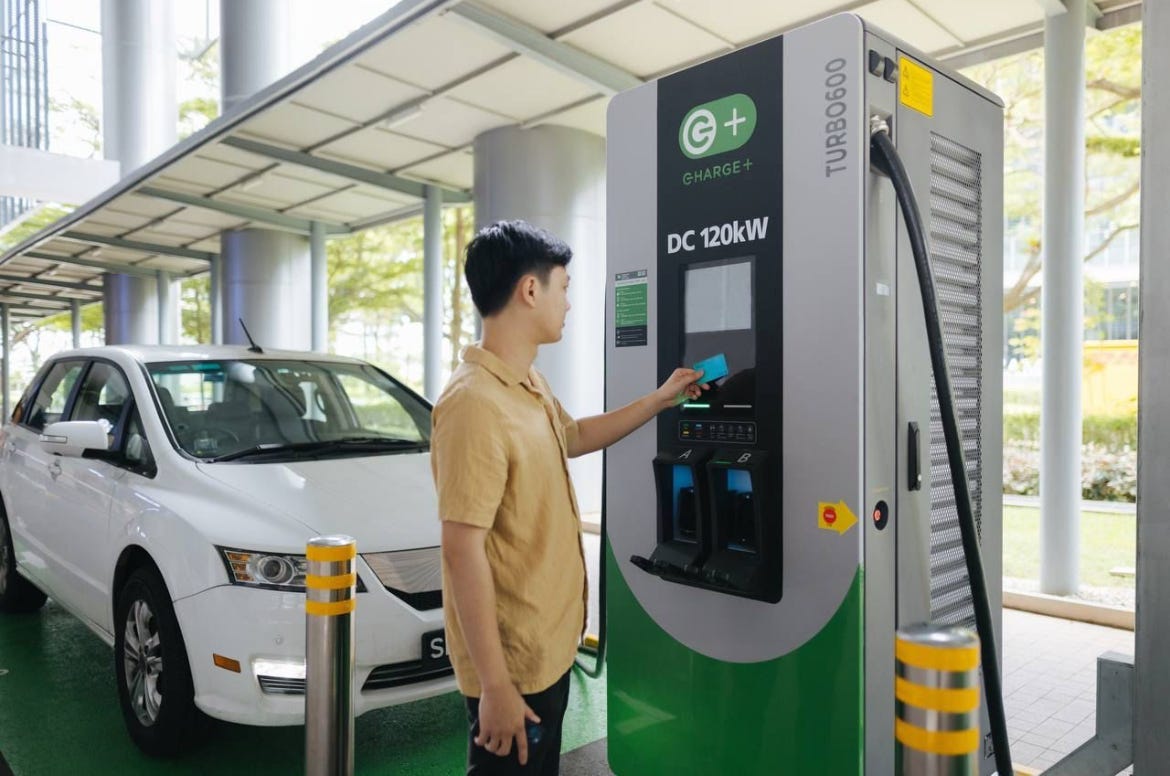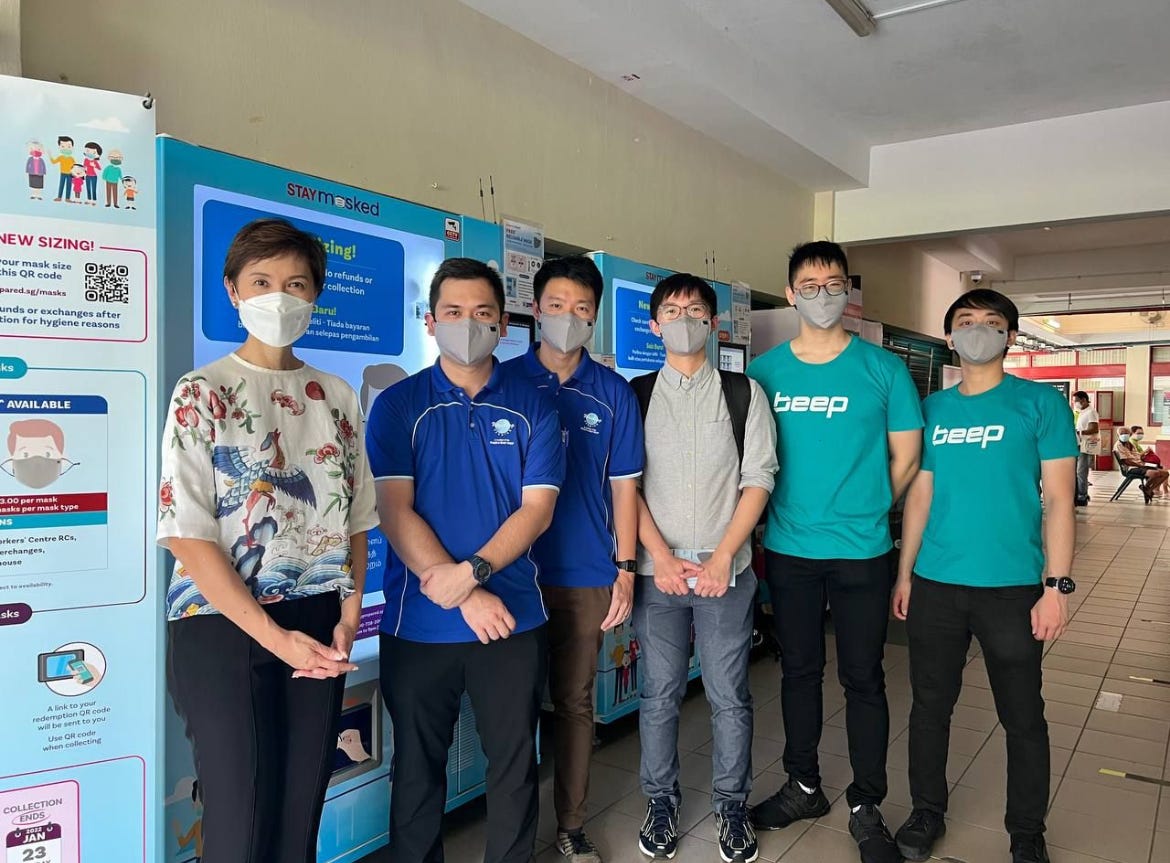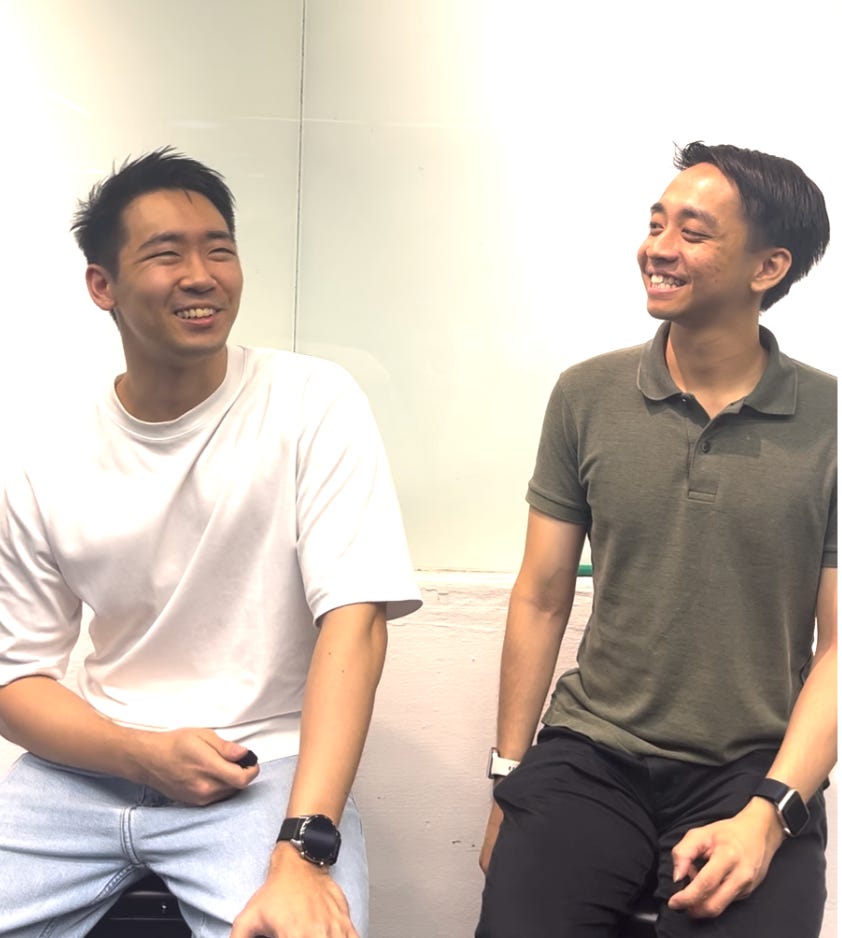#23: Beeping through thick and thin
Benjamin and Jacek’s journey from university dropouts to enabling cashless transactions for vending machines and electric vehicles
Welcome to this week’s edition of SEAmplified! Your latest insights on Southeast Asian youths in 8 minutes.
🔥 Trailblazers
Trailblazers features young startup founders, social leaders, and cultural mavericks in Southeast Asia.They dropped out of university to build a tech startup
Would you give up your university education and a stable career path to start a business?
I’m not sure I would, but Kristoffer Jacek Soh, 26, and Benjamin Long, 27, chose to do so in 2019 after spending a year building Beep Technologies.
Founded in 2018, Beep is a unified Internet of Things (IoT) platform that enables connectivity for transactions in unattended retail in Southeast Asia, such as vending machines and electric vehicle (EV) charging.
For example, they utilized their technology to repurpose vending machines for Singapore’s mask distribution exercise during Covid-19. They did so by enabling residents to collect masks from vending machines by scanning their identification cards, which accelerated the mask distribution process.
During my chat with the two co-founders, I quickly learned that the decision was not made lightly.
Back then, Benjamin and Jacek had just completed their military service and had only a few months to go before starting their undergraduate studies in Computer Science at the National University of Singapore (NUS).
Their first product was to unify multiple payment methods such as credit cards and QR codes into a single payment platform for vending machines.
They noticed that vending machines in military camps only accepted coins, and wondered if they could come up with a way to let soldiers pay using their transport card, since they may not have enough coins when in camp.
By the time they gained traction amongst potential vendors and clients, they had already spent two semesters of leave of absence (LOA) working on the idea. That was also when they realized that they needed more funding to sustain the operations of their newly-born startup.
“Although we were incoming students, NUS was still very open to help, and they advised us to get the founders grant from the government and NUS Enterprise which fully supported us,” said Jacek.
Benjamin also felt that given the progress that they were already making, they believed that they could learn more from building Beep instead of attending Computer Science classes in school. To him, it was akin to conducting a cost-benefit analysis, before deciding to drop out.
But did the decision to drop out eventually pay off?
An unlikely journey

Within five years, Beep grew from zero to connecting over 30 payment methods and powering tens of millions of transactions across Southeast Asia. They were also awarded the Covid-19 Resilience Medal from the Singapore government for helping to repurpose vending machines for the country’s mask distribution exercise.
In 2022, they launched Voltality, a subsidiary enabling EV drivers across Southeast Asia to charge their vehicles and make payments at any EV charging station. They noticed that EV drivers had to download multiple apps to charge their vehicles at charging stations operated by different companies.
The e-Roaming project – as Jacek called it – now has 11 operators in three countries, and more expansion plans are in the works.
More recently, Benjamin and Jacek were surprised to find that they were inducted into Forbes 30 Under 30 Asia 2024. They said that it wouldn’t have been possible without the support of their team, investors, mentors, partners, and customers.
With these achievements, Benjamin and Jacek could say that their decision to drop out has paid off.
But these may not have occurred if they hadn’t met as secondary school classmates and become close friends, since they had very different interests.
For one, Jacek was more interested in economics and business. He began to sell snacks to earn pocket money in his first year in secondary school, before moving on to trading through computer games like Team Fortress and Counter-Strike.
He then joined an international business competition related to social innovation in junior college, which exposed him to the world of entrepreneurship. His team came up with a job portal idea that will enable users to upskill themselves using government-sponsored credits, and they flew to Copenhagen to visit a few startups to learn about innovation.
Meanwhile, Benjamin was more interested in computer games and all things technical. He initially joined the computer club just to play games, but he unexpectedly found himself venturing into the world of programming.
“It gave me a lot of exposure into how you can build your own computer, how you can code in C++, and how you run Minecraft servers,” said Benjamin. From there, he began experimenting with various applications and operating systems, such as installing drivers on Arch Linux.
Benjamin also believed that his interest in programming would set him on the path of wanting to make an impact on the communities that he was involved in. He took up leadership positions in the computer club, and subsequently in a uniformed group in junior college.
Coming together as co-founders

But the idea to start Beep only began during their military service, when Jacek was exploring a food ordering system idea with a friend who was interested in payment solutions.
Jacek noticed that junior college students had to spend most of their 40-minute break queuing for food, in a canteen with limited options. The idea was to help them save time by ordering food through an app with their student transport card.
While they had no trouble coming up with the food ordering system, they found another problem that was hard to tackle.
“The hard part we realize is figuring out the payment problem, it’s a very deep rabbit hole,” said Jacek. He shared that the intricacies of payment systems are complex and they had to take a lot of time and effort to learn. They also took time to speak to canteen vendors to understand their pain points and convinced a few payment companies to work with them.
By the time they gained potential customers, Singapore launched “SG QR”, a unified quick-response payment system. This prompted them to pivot into coming up with payment solutions for vending machines instead.
But he felt that they needed one more person willing to build the payment solution in the long run—someone intrinsically motivated since they couldn’t afford to hire people. And Benjamin quickly came to mind.
“I mean, I didn’t have a big group of friends since I’m an introvert,” explained Jacek, “And based on our friendship and past work experience, Ben hit all the checklist.”
Meanwhile, after completing a nine-month course to become a military officer, Benjamin was looking at picking up new technical skills during his remaining time in military service.
He could relate to the problem, and he found the idea interesting enough to work on.
“I think that was also because of the curiosity I had at that time,” adds Benjamin.
With that, Beep was born.
Being friends v.s. being co-founders
Now, to start a company at the age of 21 with your friend may be an impressive feat. But I wondered: should people even start a business with a close friend?
After all, being friends and co-founders can be very different. But my question turned out to be a point of contention for Benjamin and Jacek.
For one, Benjamin believes that people need to be selective when they find a co-founder because starting a company with a partner is akin to getting married. But he’s not sure if co-founders need to be friends beforehand, since disagreements will arise in any working relationship.
To him, it doesn’t matter if co-founders knew each other well previously, as it is more important to be rational during decision-making instead of being emotional.
But Jacek strongly believes that people need to be friends and know each other well before co-founding a company together.
“If you don’t know that person, you’re taking a really big gamble,” said Jacek.
He believes that people are better able to settle any arguments professionally if they’re friends and know each other’s personality and working style beforehand. To him, being friends is simply an incentive for co-founders to resolve tensions, as any disagreements that are not handled carefully could affect employees.
Benjamin and Jacek also shared that while it is common to have disputes, two key ingredients have kept their relationship intact: compromise and integrity.
On compromising, Benjamin brought up an example of how they resolved their differences over the company’s budget allocation.
As CEO and CTO respectively, Jacek and Benjamin have different perspectives on how to utilize the company budget. Jacek tends to place more focus on business development needs, while Benjamin often first considers a product’s technical needs.
Jacek adds that they’ve never been on opposite spectrums, as they will always make it a point to come up with plans and milestones to support their idea if others are not convinced of them beforehand.
The duo also appreciates each other’s integrity, and credit their longstanding friendship which enabled them to trust each other.
“I’ve heard horror stories of people cheating each other and disappearing after embezzling money, but luckily I don’t have to worry because I trust Jacek to place the company’s interest over personal ones,” said Benjamin.
Going along with Benjamin, Jacek also felt that since they knew each other well, there was no reason for them to be afraid that one of them would cheat or disappear.
With their friendship and trust intact, the thought of working on Beep all over again together was a no-brainer for both Benjamin and Jacek. They couldn’t think of anyone else who could have gone through the journey that they embarked on.
“Going the conventional route would have been a simpler life, but we don’t know if we would have been more fulfilled, ” said Jacek.
“It has truly been a crazy journey,” Benjamin quipped.
PS: Check out “3 Questions with Trailblazers”, our new Instagram-exclusive video series featuring Trailblazers who answered three random questions from us. Catch what Benjamin and Jacek have responded to on our Instagram @seamplified.news now!
Enjoyed today’s article? Follow SEAmplified on Instagram and LinkedIn for exclusive content, hit the subscribe button, or tell us how we did in the poll below!
Have a new idea or lead for a story, feedback on our work, or just want to say hi? Email the editor at tanzhantiam@gmail.com




